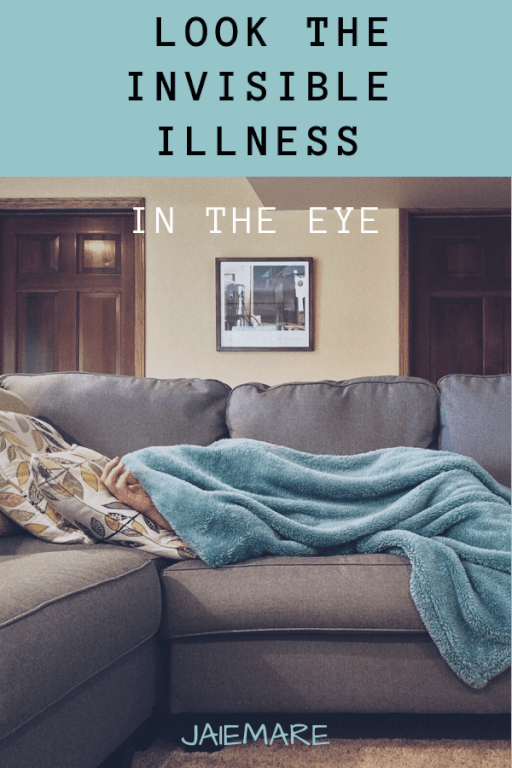LOOK THE INVISIBLE ILLNESS IN THE EYE

Experiencing chronic pain and fatigue every day can lower the quality of life. Routine things once enjoyed like travel, getting around, running, and cooking in luxury become difficult to maintain.
Routine and complex work tasks take longer to complete. You might be thinking about quitting your job.
A recent chronic illness diagnosis makes it hard to digest and well what is an invisible illness?
An invisible illness is an umbrella term for any medical condition that isn’t easily visible to others.
Not all chronic illnesses like fibromyalgia, lupus, chronic pain, fatigue, arthritis, diabetes, and others are not immediately apparent.
Explaining chronic pain to someone is difficult when you don’t understand what is happening to you. All you know is it just hurts all over and want it to stop.
It could be easy to ignore symptoms of pain, fatigue, sleep disturbances, thyroid problems, and cognitive problems commonly called brain fog.
Considering these symptoms as not a big deal and think a glass of wine combined with pain killers will make the problem go away may work temporarily, but long-term, if not addressed by a health care professional, symptoms can worsen.
Understanding chronic pain from the start will help you understand you’re not alone and there are effective alternative treatments out there to help manage your symptoms.

I found a wonderful analogy to explain fibromyalgia/chronic pain to others that they can relate to.
My pain feels like my nerves are literally on fire followed by pins and needles feeling like I am being poked like a pin cushion.
Once I understood what my diagnosed conditions were, I made it a mission to learn how to explain chronic pain to others, how to stay positive with chronic pain, and how to live with the pain.
It’s not easy because I hate routine, but when I don’t stretch, skip an acupuncture treatment, my pain levels increase, and I can’t do the things I like to do, go for a walk, travel, and meet friends for coffee.
You Don’t Look Sick
If you’re still working, some of your co-workers may perceive you trying to gain sympathy or trying to get out of work to put your feet up.
As word gets around about your condition from either your boss or the office gossip queen (or king), co-workers’ attitudes change. A hostile working environment is soon created causing more stress.
Just because they can’t see you struggling internally, it doesn’t mean your symptoms of physical pain don’t exist.
Instead of focusing on your health and scheduling holistic treatments like massage, cupping therapy or acupuncture, you are worried about what is being said about you.
Requesting a Reasonable Accommodation
Ailments and injuries can continue to accumulate until there is no option except to either find a less physically demanding job or go into earlier retirement. Let alone the financial strain that occurs if one is not prepared for this drastic lifestyle change.
Don’t be afraid to have a conversation with your boss and ask for a flexible schedule, change in hours, or a change in duties due to pain levels. You might be surprised in the outpouring of support and generosity received.
Under the Americans with Disabilities Act (ADA), employers are required to provide reasonable accommodations to qualified employees with disabilities, unless doing so would pose an undue hardship.
Federal employees and applicants are covered by the Rehabilitation Act of 1973, instead of the Americans with Disabilities Act.
If you are experiencing disability discrimination in the workplace, you can file a discrimination complaint.
Telecommuting Can Benefit Your Health
The growing remote working options have made it possible for flexible scheduling so you can focus on reversing the damage caused by a sedentary lifestyle.
Working from home due to health issues can make adjusting to a new lifestyle enjoyable. How would you like to enjoy living pain-free?
Working remotely reduces the stress of a daily commute, wear and tear on your car, saves you money on gas, childcare, and buying new clothes for the office.
Now that I work from home, I have more time to work out and schedule weekly acupuncture treatments for headaches, hormone imbalances, and chronic pain.
As I am typing this, I am walking on my under desk treadmill. I repurposed a drawing desk to create my stand up desk during the day to combine work and a little exercise.

Adding a desk riser creates multiple standup opportunities rather than sitting in a chair that can be moved and used in the kitchen, in the living room, or in the bedroom.
Working remotely can allow you to prioritize self-care and put your energy towards hobbies you enjoy.
Having a support system around along with individuals who have similar chronic conditions can make you feel less alone.
Are you thinking about working from home, but nervous about taking the leap? Check out my blog post, Is Working Remotely Right for You?
<script> __ATA.cmd.push(function() { __ATA.initDynamicSlot({ id: 'atatags-1608172891-673643dcaa00e', location: 120, formFactor: '001', label: { text: 'Advertisements', }, creative: { reportAd: { text: 'Report this ad', }, privacySettings: { text: 'Privacy settings', onClick: function() { window.__tcfapi && window.__tcfapi('showUi'); }, } } }); }); </script>
Reply